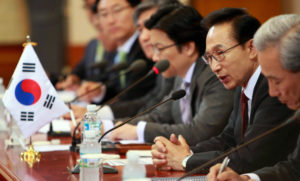 As reported last week in the New York Times, South Korea is seeking renegotiation of a 1974 treaty that bars it from acquiring spent nuclear fuel reprocessing or uranium enrichment plants–so-called “fuel cycle facilities” that can be used both to support a nuclear energy sector or an atomic weapons program. At the time the treaty was adopted, the right-wing authoritarian South Korean government was understood to have some interest in developing nuclear weapons, and so the treaty was implicitly intended to block that path.
As reported last week in the New York Times, South Korea is seeking renegotiation of a 1974 treaty that bars it from acquiring spent nuclear fuel reprocessing or uranium enrichment plants–so-called “fuel cycle facilities” that can be used both to support a nuclear energy sector or an atomic weapons program. At the time the treaty was adopted, the right-wing authoritarian South Korean government was understood to have some interest in developing nuclear weapons, and so the treaty was implicitly intended to block that path.
Today, the democratic South Korean government’s ostensible rationale for wanting to reprocess spent nuclear fuels is to help deal with a seemingly intractable spent fuel disposal problem. But, as Princeton’s Frank von Hippel explained in an analytic article last year, the notion that reprocessing solves the waste disposal problem is dubious to begin with, and in South Korea’s case there is an obvious alternative.
Of course, like other countries that have intently sought fuel cycle facilities in the past–Germany, Japan, Brazil, to name the most significant–it is implicitly understood in South Korea that such facilities could open the road to a nuclear weapons program. At a time when North Korea has gone nuclear in defiance of concerted international efforts to stop it, having that fall-back nuclear weapons capability must be widely considered not such a bad thing in South Korean governmental circles.
In light of what clearly is a genuine North Korean threat, it would be better in principle if the case against South Korean reprocessing could be argued strictly in terms of energy, as that may be the more effective argument. But given that revision of a 1974 treaty is involved, inevitably the United States will have to make its case on the basis of arms control–and that means it ultimately may have to give in.
If it did, how would the South Korean situation be different from Iran’s, where the United States and the other great powers are taking an ultra-hard line. There are two obvious differences, and they are huge. First, South Korea is pursuing fuel cycle facilities openly, whereas Iran has concealed its efforts whenever it could, in flagrant violation of Nonproliferation Treaty obligations. Second, Iran had an active and comprehensive program to actually develop nuclear weapons, and some elements of that program may be ongoing; if South Korea ever had such a program, it was in an altogether different era and under a different regime.